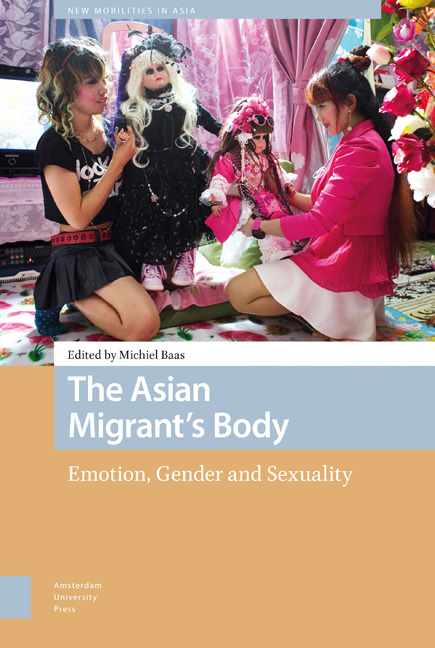Book contents
- Frontmatter
- Contents
- Introduction: Conceptualizing the Asian Migrant’s Body
- 1 ‘Not a Lesbian in Dubai, Not gay in Tehran’: Sexualities, Migrations, and Social Movements across the Gulf
- 2 Bodies at Work: Gendered Performance and Migrant Beer Sellers in Southeast Asia
- 3 Body, Space, and Migrant Ties: Migrant Domestic Workers and Embodied Resistances in Lebanon
- 4 The Day Off Policy , ‘Reverse Domestication’, and Emotional Labour among Indonesian Domestic Workers in Singapore: Maria Platt, Brenda S.A. Yeoh, Khoo Choon Yen, Grace Baey and Theodora Lam
- 5 Embodying the Good Migrant in Ageing: Negotiating Positive Subjectivities Through Paid Work
- 6 Proper Conjugation of Bodies: Chastity, Age, and Care Work in Sri Lankan Migrants’ Families
- 7 Border-crossing as Sexual Subjects: Interracial Dating Experience of Young Chinese in New Zealand
- 8 Managing Touch: The Racialized Dynamics of Intimacy in the Los Angeles Beauty Industry
- Notes on Contributors
- Index
3 - Body, Space, and Migrant Ties: Migrant Domestic Workers and Embodied Resistances in Lebanon
Published online by Cambridge University Press: 23 June 2021
- Frontmatter
- Contents
- Introduction: Conceptualizing the Asian Migrant’s Body
- 1 ‘Not a Lesbian in Dubai, Not gay in Tehran’: Sexualities, Migrations, and Social Movements across the Gulf
- 2 Bodies at Work: Gendered Performance and Migrant Beer Sellers in Southeast Asia
- 3 Body, Space, and Migrant Ties: Migrant Domestic Workers and Embodied Resistances in Lebanon
- 4 The Day Off Policy , ‘Reverse Domestication’, and Emotional Labour among Indonesian Domestic Workers in Singapore: Maria Platt, Brenda S.A. Yeoh, Khoo Choon Yen, Grace Baey and Theodora Lam
- 5 Embodying the Good Migrant in Ageing: Negotiating Positive Subjectivities Through Paid Work
- 6 Proper Conjugation of Bodies: Chastity, Age, and Care Work in Sri Lankan Migrants’ Families
- 7 Border-crossing as Sexual Subjects: Interracial Dating Experience of Young Chinese in New Zealand
- 8 Managing Touch: The Racialized Dynamics of Intimacy in the Los Angeles Beauty Industry
- Notes on Contributors
- Index
Summary
Abstract
In this chapter I contribute to a multi-scalar analysis of migrancy, by analysing the ways in which migrant domestic workers (MDWs) in Lebanon experience and shape spaces in embodied ways. I focus on sexual and spatial ties forged in public spaces like ethnic churches, and private spaces like apartments. I argue that these ties, fundamentally embedded in the migrant's body, are employed for forging conjugal and sexual ties and forming work alliances with colleagues. An analysis of these ties deepens conversations around the migrants’ body as a scale of power and resistance, and challenges the portrayal of MDWs in the Arab world as ultimate victims of abuse. At another level, these ties challenge the boundaries between the private-public and sacred-sexual.
Keywords: migrant domestic workers, Lebanon, sexual ties, abuse, private-public
Here I am, teaching to my sisters, “Be strong! Everything is not dark … tomorrow there is a light. When there is a mountain in your life, face it! Don't run”. So, I am teaching them how to respect her (the employer), at the same time, respect yourself. Make it a balance with your response … make it a balance. You have to know your right. If they shout at home sometime, remember they can shout sometimes. Don't forget that running away will make you a thief (illegal). But tell them, with respect, it is not their right to shout, this is my work … But if they hit you, raise a hand at you, raise your hand and stop the shoe. God will not stop the shoe for you [emphasis in the original]. (Pastor Vanessa, a former migrant worker preaching at a Pentecostal church for African domestic workers in Tripoli, Lebanon).
All day, all week, they do not want to think of me like I am a lady. I am only a Srī Lankīyyī, ya ‘ni(that is). But when I wear my boots, and my purse on Sunday, they only think of me as on the street (as a sex worker). My madam even checks my cellphone to see if I have a boyfriend. What if I do? [Laughs and points to two other women in the church courtyard] Heee! See her and her, they were not on the street. They found their mates (husband) in this place. They find God, but he sends the husband as bonus! Aanjad (really), this is the miracle of our churchyard.
- Type
- Chapter
- Information
- The Asian Migrant's BodyEmotion, Gender and Sexuality, pp. 69 - 88Publisher: Amsterdam University PressPrint publication year: 2020



